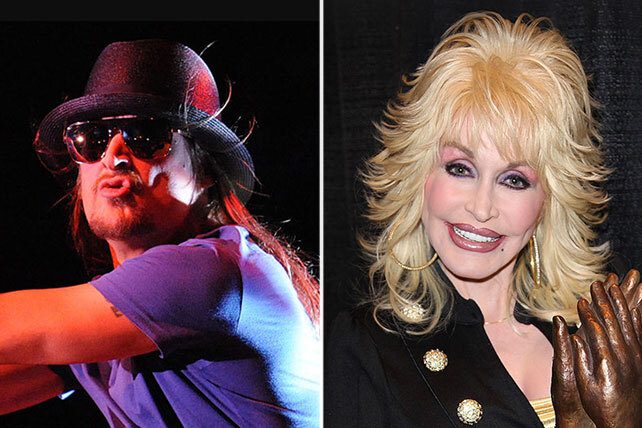Music legend Dolly Parton has defended her decision to collaborate with Kid Rock on her forthcoming album, saying that she loves and forgives everyone just as God does.
“I love everybody. I don’t criticize, I don’t condone nor condemn,” Parton told The Hollywood Reporter (THR) in an interview on Nov. 2. “I just accept them. But anyhow, just because I love you don’t mean I don’t love Kid Rock in that God way.”
RELATED: Dolly Parton Points Viewers to Jesus, Tells the Devil To ‘Go to Hell’ in Star-Studded Christmas Special
Dolly Parton To Release New Album, ‘Rockstar’
Dolly Parton is a country music star and one of the bestselling female artists of all time. During a career that spans more than five decades, she has received numerous awards and accolades. Parton is also an actor and is known for her Dollywood theme park and philanthropic efforts.
The singer was recently invited into the Rock and Rock Hall of Fame, an honor she initially declined because she is a country music singer. However, she accepted after learning that the Rock and Rock Hall of Fame includes artists outside of the rock genre. “But I still didn’t feel great about it,” she said. “I still thought I needed to earn it.”
So Parton created her first rock album, “Rockstar,” which will release on Nov. 17. The album features a star-studded list of collaborators, including Sting, Lizzo, Steven Tyler, Stevie Nicks, Miley Cyrus (Parton’s goddaughter), Pat Benatar, Paul McCartney, Ringo Starr, and Elton John.
Track seven on the 30-track album is a duet between Parton and Kid Rock titled “Either Or.” When fans found out about the collaboration, a number of them criticized Parton for working with Kid Rock.
Kid Rock is the stage name of Robert James Ritchie, a rapper and country rock singer who rose to fame through his fourth album, “Devil Without a Cause.” Ritchie is known for hits including “Cowboy,” “Bawitdaba,” “All Summer Long,” and “Picture,” a duet with Sheryl Crow. He is reportedly an ordained minister and is known for various controversies including arrests for assault and substance abuse, displaying a Confederate flag during his concerts, and using homophobic slurs.
Notably, Parton has a substantial gay following and is known for her support of the gay community. “I have some of everybody in my own immediate family and in my circle of employees,” she told The Hollywood Reporter. “I’ve got transgender people. I’ve got gays. I’ve got lesbians. I’ve got drunks. I’ve got drug addicts—all within my own family. I know and love them all.”
Parton does not see it as her place to judge people for their decisions. “If there’s something to be judged, that is God’s business,” she said. “But we are all God’s children and how we are is who we are.”
The country singer told THR that she recorded her duet with Kid Rock “before the controversy that he had,” but she did not specify what the controversy was. It’s possible Parton was referring to Kid Rock’s opposition to Bud Light after the brand partnered with trans influencer Dylan Mulvaney.
Nevertheless, Parton maintained the importance of accepting and loving others, calling cancel culture “terrible.”
“We all make mistakes,” she said. “We don’t all get caught at it. But also when somebody makes a mistake, it depends on who they are. That’s what God is there for.”
“Now, I happen to believe in God; I’m a faith-based person, so therefore I am able to see it like that,” Parton continued. “A lot of people don’t, but even still, everybody deserves a second chance. You deserve to be innocent until you’re proven guilty. Even when you’re proven guilty, if God can forgive you, so can I. If God can forgive you, we all should forgive one another.”
During the interview, Parton also shared her thoughts on AI. When asked if she would ever “consider an AI recording of Elvis singing [Parton’s hit] ‘I Will Always Love You,’” she replied, “I ain’t going to consider AI on nothing that’s human being.”
In 1974, Parton refused to let Elvis record her hit single because his manager wanted half of the publishing rights. Whitney Houston eventually recorded it instead in 1992, and the song became the biggest single of Houston’s career, breaking several records.
Parton called AI “a weapon and a tool that can be scary,” although she acknowledged “I think it’s going to be great for a lot of things, like science and medicine and many, many things.”
“But not to replace human beings,” she continued. “That scares me to death. That’s like the mark of the beast…not to replace voices and writings and not to replace a human being that belongs to God.”
